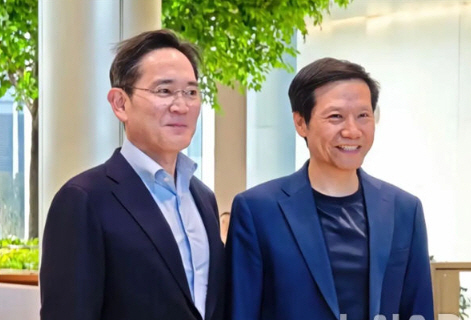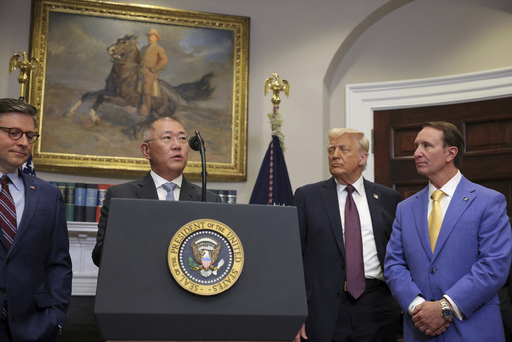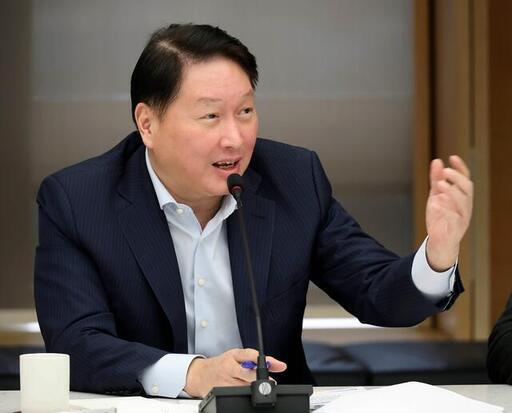


Domestic business leaders are taking urgent actions to respond to the global crisis. Samsung Electronics Chairman Lee Jae-yong, Hyundai Motor Group Chairman Chung Eui-sun, and SK Group Chairman Chey Tae-won, who is also the chairman of the Korea Chamber of Commerce and Industry, are focusing on securing strategies to enhance competitiveness in dealing with key factors in countries such as the U.S. and China.
According to industry sources on the 30th, Samsung Electronics Chairman Lee Jae-yong returned to South Korea after completing a week-long business trip to China, where he met with Chinese President Xi Jinping on the 28th, alongside global CEOs. This meeting was the first between Chairman Lee and President Xi in over 10 years, following their encounter at the Boao Forum in China in March 2015. During his trip, it is reported that Chairman Lee sought business cooperation with local electronics and electric vehicle companies.
Samsung Electronics' focus on the Chinese market is evident in its local revenue and operating profit. According to the company's business report, last year's revenue from China reached 64.9275 trillion won, a 53.9% increase (approximately 22.7 trillion won) compared to the previous year, which stood at 42.2007 trillion won. Although the report does not separately disclose revenue for regions in the DX (Device Experience) division, which handles mobile and consumer electronics, and the DS (Device Solutions) division, which oversees semiconductor operations, it is known that the majority of products exported to China are semiconductors. The performance of Samsung's sales and production subsidiaries in China also improved. Samsung China Semiconductor (SCS), the NAND flash production subsidiary in Xi'an, China, recorded revenue of 11.1802 trillion won and operating profit of 1.1954 trillion won last year. This represents a significant improvement compared to the 2023 performance, which saw revenue of 8.6938 trillion won and operating profit of 878 billion won amidst a slowdown in the industry.
An industry insider commented, "Chairman Lee's visit to China, despite pressure from the Trump administration, underscores the importance of the Chinese market. It is likely that this trip included discussions on investments in new high-tech businesses in China." On the first day of his visit, Chairman Lee visited Xiaomi's electric vehicle factory, where he held an impromptu meeting with Chairman Lei Jun, and also made a visit to BYD's headquarters, showcasing his active approach to expanding Samsung's business in China.

Hyundai Motor Group Chairman Chung Eui-sun is making significant investments, focusing on the U.S. market. On the 24th (local time), Chairman Chung met with U.S. President Donald Trump in the White House Roosevelt Room and announced plans for major investments in the U.S. market. On the 26th, he attended the groundbreaking ceremony for the "Hyundai Motor Group Metaplant America (HMGMA)" in Ellabelle, Georgia. At the ceremony, Chairman Chung declared, "This will serve as a central hub for our global factories." This new plant marks Hyundai's latest challenge, coming 20 years after his father, Honorary Chairman Chung Mong-koo, completed the Alabama plant in the U.S. in 2005.
Chairman Chung's efforts in the U.S. market are aimed at maintaining the momentum of local growth. Last year, Hyundai Motor Group achieved record sales, with Hyundai selling 911,805 units and Kia selling 796,488 units in the U.S. This marked the highest sales for both companies in their history. Hyundai and Kia surpassed 1 million cumulative sales in the U.S. in 1990 and crossed the 5 million mark in 2004. Since 2011, the companies have consistently exceeded 1 million units in annual sales, continuing their rapid growth.
Hyundai Motor Group has secured a production base in Georgia with an annual capacity of 300,000 units, establishing a local production system capable of producing 1 million units. The company plans to expand this capacity to 1.2 million units through further expansions. This move is aimed at minimizing the burden of the 25% import tariff on foreign cars imposed by the Trump administration and strengthening local competitiveness.
SK Group Chairman and Korea Chamber of Commerce and Industry Chairman Chey Tae-won recently voiced concerns regarding the revised Commercial Act and the issues with the 52-hour workweek system. This is the first time Chairman Chey has directly expressed his opinions on the Commercial Act amendment, which appears to represent the interests of local businesses.

Chairman Chey Tae-won expressed, "Given the current circumstances, I question whether it is the right time to amend the Commercial Act." He continued, "South Korea is facing a 'super unknown' era, with a combination of trade issues, inflation, financial instability, AI-driven technological shocks, and domestic political problems. In such a situation, decisions within companies are inevitably delayed, and I question whether it is the right moment to change the Commercial Act." The term "unknown" refers to risks arising from uncertainties that are entirely unpredictable.
Chairman Chey also expressed concerns about the failure to pass the Semiconductor Special Act, which would allow for an exemption from the 52-hour workweek system for semiconductor research and development (R&D). He emphasized, "While I understand the purpose of introducing the 52-hour workweek exception, regulating it by law is different. If you're only allowed to take a bus but need to take a taxi to reduce travel time, you have no other choice. Regulations suppress autonomy and stifle creativity, which does not help growth or solve societal problems."
ChatGPT를 사용하여 번역한 기사입니다.


 Copyright ⓒ 메트로신문 & metroseoul.co.kr
Copyright ⓒ 메트로신문 & metroseoul.co.kr
Copyright ⓒ Metro. All rights reserved. (주)메트로미디어의 모든 기사 또는 컨텐츠에 대한 무단 전재ㆍ복사ㆍ배포를 금합니다.
주식회사 메트로미디어 · 서울특별시 종로구 자하문로17길 18 ㅣ Tel : 02. 721. 9800 / Fax : 02. 730. 2882
문의메일 : webmaster@metroseoul.co.kr ㅣ 대표이사 · 발행인 · 편집인 : 이장규 ㅣ 신문사업 등록번호 : 서울, 가00206
인터넷신문 등록번호 : 서울, 아02546 ㅣ 등록일 : 2013년 3월 20일 ㅣ 제호 : 메트로신문
사업자등록번호 : 242-88-00131 ISSN : 2635-9219 ㅣ 청소년 보호책임자 및 고충처리인 : 안대성